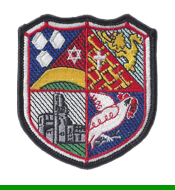The Book of Sermons
An important part of Cumberland County history exists in the form of a book of sermons for the Liturgical Year that once belonged to Carl Christlieb. Among his obligations as Deacon, he would have presented sermons on a regular basis, as ordained clergy visited only a few times per year. On these occasions, they would administer Holy Communion, perform baptisms, and solemnize marriages.
A translation of the lengthy title page reads:
“EVANGELICAL PENITENTIAL SERMONS CONCERNING VARIOUS TEXTS
OF HOLY SCRIPTURE, PARTLY PREACHED IN POTSDAM,
PARTLY IN ZOSSEN WITH THE HELP OF GOD,
AND PUBLISHED BY REQUEST WITH AN APPENDIX AND
NECESSARY REGISTERS BY HEINRICH SCHUBERT, HEAD
PASTOR AND INSPECTOR IN ZOSSEN.”
HALLE, THE PRINTING HOUSE OF THE ORPHANAGE, 1751.

An investigation into the possibility that this book was purchased in America concluded with the belief that, in all likelihood, it was among the cherished belongings that Friedrich Carl and Anna Catharina Christlieb carried when they immigrated to America in 1765.

Flyleaf of the book printed in Germany in 1751.
Carl may have done the scrivener artwork on the flyleaf. It reads, “This book of sermons belongs to him.” A poem in his handwriting completes the decoration.

Ich wünsche, das alle, das wordt,
O Seelen Gottes Wordt lag Nie Aus euren Händen
Fordt; Verliert der Glaube Nur die Schrift: so weiß
der Teufel, wo er trift wer aber Jesu worde best-
ändig zält, der wirdt durcht Kein Versuchungsnetz
gefelt.
Translation:
I desire all that, the Word.
O souls, God’s word never lay out of your hands.
If faith just loses the writing, the devil knows where he strikes.
But whoever always recounts Jesus’ words,
He will not be trapped by any net of temptation.
Well-known scholar and translator, Ernest Thode, added: “But this is a poem, not placed with rhyme words at the end like modern English poetry, so I have underlined the rhyme words in italics.”
I desire it all, the Word.
O souls, the Word of God
Was never from your hands apart,
If faith should lose the written word
The devil knows where he’ll be heard.
If Jesus’ words by heart you know
Temptation can’t trap you where’er you go.
Here follows Ernest Thode’s explanation of the symbolism employed in the scrivener art, seen on the flyleaf page:
Chain – the link that binds the faithful to God.
Bird – the soul, or eternal life.
Flower – life, beauty; if the flower is a rose, unfailing love.
Thorns – difficult, unpleasant times; life’s thorny situations.
Nail – holding things together; Christ’s death on the cross.
Thode’s hypothetical explanation for the “Ch” in Carl is as follows:
“I believe it is an error. Based on the spacing of the capital F, (first) capital C, and capital D, the Fraktur scrivener (or maybe Friedrich himself) possibly started by first getting the placement of the capital letters, intending to write Friedrich Christlieb, but then decided to put in Carl, but not until after he had finished the Ch of the beginning of Christlieb.”
In 2009, Carl Christlieb’s descendant, Lee Wise, La Mesa, California (later, Prescott, Arizona) and owner of the book of sermons, donated it to the Cumberland County Historical Library in Carlisle, Pennsylvania.

